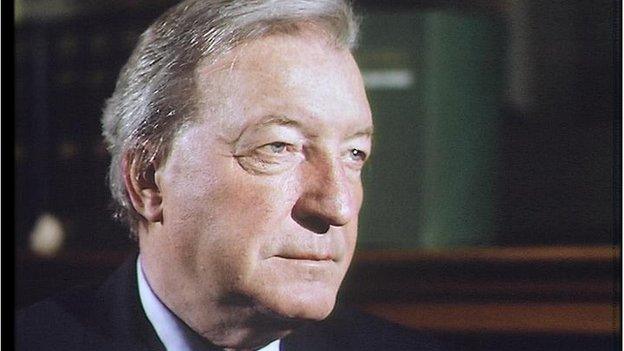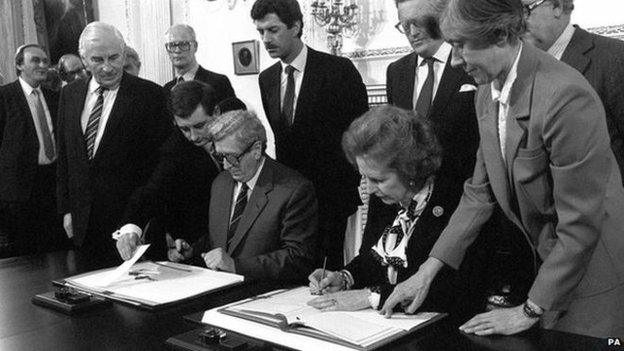NI 1987 state papers: Haughey 'laid Anglo-Irish Agreement foundations'
- Published

Newly released papers see Charles Haughey described as "a highly pragmatic and astute politician"
Charles Haughey was "a highly pragmatic and astute politician" who had laid the groundwork of the Anglo-Irish Agreement, according to declassified files.
This assessment of the controversial Fianna Fáil leader and Irish prime minister (taoiseach) between 1987 and 1992 has been revealed in previously confidential files released on Friday by the Public Record Office.
P N Bell, a senior official from the Northern Ireland Office (NIO), made an assessment of Mr Haughey's record for the British Secretary of State, Tom King.
The report, dated 12 December, 1986, noted: "The present Anglo-Irish Agreement stems from initiatives taken on the Irish side by a Fianna Fáil administration, led by Mr Haughey. At his summit meeting with Mrs Thatcher in December 1980, a series of joint studies were started."
The most important conclusion of these was that "formal institutional structures should be created between the heads of government, ministers and officials".
'Relatively warm relations'
According to the official, this body still existed as the formal framework for summit meetings between the two countries and for the new Anglo-Irish Intergovernmental Conference.
Mr Bell added that in the period 1980-82, Mr Haughey had attached considerable importance to the institutional changes and on the UK commitment "to study the totality of relationships in these islands".
Also, his successor as taoiseach, Dr Garret FitzGerald, had "often observed (that) the Anglo-Irish Agreement was the result of initiatives begun by his predecessor".
The memo noted that "the relatively warm relations with Mr Haughey" had deteriorated since 1982 due to his position during the Falklands conflict and his attitude to the Northern Ireland Assembly established by Jim Prior.
Indeed, Mr Bell noted, the Fianna Fáil leader had been "instrumental in persuading the SDLP not to participate in the assembly" [closed by the British government in 1986].
Nevertheless, Mr Haughey's record of security co-operation seemed to be "no worse than that of Dr FitzGerald. Indeed, there are some reasons for believing that the garda [police] are more inclined to be forthcoming under a government led by Mr Haughey since they no longer fear a future Fianna Fáil government looking askance at their activities".
In an accompanying paper entitled, Doing Business with Mr Haughey, Mr Bell anticipated an Irish general election in 1987, possibly resulting in the return of Mr Haughey as taoiseach.

Margaret Thatcher and Dr Garret Fitzgerald signed the Anglo Irish Agreement in 1985
'Extreme positions'
Faced with such a possibility, the official argued that it was in Her Majesty's government's interests "to tie any [sic] Irish government to the Anglo-Irish Agreement: there is no better framework available for improving security cooperation", including extradition.
Nor, he added, was there any better means of demonstrating (in the absence of devolution) "that nationalists' interests will be respected in our [UK] decision-making".
In the case of a Haughey administration, the existence of the agreement might serve to discourage him "from taking extreme positions either domestically or internationally about Northern Ireland.
"For example, it would be harder for a Fianna Fáil government to try and use the powerful Irish-American lobby to our disadvantage. It might also help restrain his tendency to sudden or irrational impulses of hatred towards British governments, as shown, for instance, during the Falklands conflict. It might also make it harder to turn a deaf ear to our requests for extradition..."
While there was no certainty as to how Fianna Fáil would approach the Anglo-Irish Agreement in office, Mr Haughey had criticised it in his Bodenstown speech on 12 October, 1986, "for failing to deliver" for the northern minority.
However, it was highly relevant that Mr Haughey had originally miscalculated the mood of the Irish public who saw the accord as progress.
He had later moderated his stance, informing the British Ambassador, Sir Alan Goodison, in July 1986, that there was no question of his government repudiating an international agreement undertaken by its predecessor.
'Republican drum'
Mr Bell concluded: "This was a far cry from his Bodenstown rhetoric".
Sir Alan felt that, "while Mr Haughey is likely to bang the republican drum in public, he would endeavour not to put in danger the benefits which the agreement offered the two governments and for the nationalist people of Northern Ireland".
Mr Goodison said it was "a tricky policy but he is, by nature, a tricky man".
In the official's view, "Mr Haughey's record reveals him a highly pragmatic and astute politician with few scruples and a keen eye for the main chance. It also displays him as the Irish statesman who did most to promote the Anglo-Irish dialogue which culminated in the present Agreement".